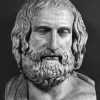Anaxagoras

Anaxagoras
Anaxagoraswas a Pre-Socratic Greek philosopher. Born in Clazomenae in Asia Minor, Anaxagoras was the first to bring philosophy to Athens. According to Diogenes Laertius and Plutarch, in later life he was charged with impiety and went into exile in Lampsacus; the charges may have been political, owing to his association with Pericles, if they were not fabricated by later ancient biographers...
NationalityGreek
ProfessionPhilosopher
unseen glimpse appearance
Appearances are a glimpse of the unseen.
mathematics stills smallest
There is no smallest among the small and no largest among the large, but always something still smaller and something still larger.
glimpse appearance
Appearances are but a glimpse of what is hidden.
self mind infinite
All other things have a portion of everything, but Mind is infinite and self-ruled, and is mixed with nothing but is all alone by itself.
philosophical share
In everything, there is a share of everything
god moon rocks
Everything has a natural explanation. The moon is not a god but a great rock and the sun a hot rock.
taken men two
Men would live exceedingly quiet if these two words, mine and thine, were taken away.
moon sun brightness
The sun provides the moon with its brightness.
science stones littles
The Sun is a mass of fiery stone, a little larger than Greece.
numbers together infinite
All things were together, infinite both in number and in smallness; for the small too was infinite.
science atoms impossible
Neither is there a smallest part of what is small, but there is always a smaller (for it is impossible that what is should cease to be). Likewise there is always something larger than what is large.
moon heaven sun
The purpose of life is the investigation of the Sun, the Moon, and the heavens.
numbers would-be should
And since the portions of the great and the small are equal in number, so too all things would be in everything. Nor is it possible that they should exist apart, but all things have a portion of everything.
lost lost-me athenians
It is not I who have lost the Athenians, but the Athenians who have lost me.